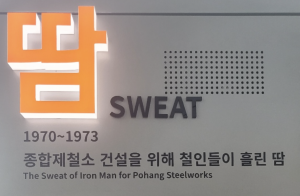Case Studies Winter 2024
Case study reports produced by students in UCI Anthro25A, "Environmental Injustice," in Winter 2024.
Case study reports produced by students in UCI Anthro25A, "Environmental Injustice," in Winter 2024.
Slow disaster case study reports produced by students in UCI Anthro25A, "Environmental Injustice," in Fall 2022.
Combo disaster case study reports produced by students in UCI Anthro25A, "Environmental Injustice," in Fall 2022.
Photo essay of wall text of POSCO Museum of Pohang

By Scott G. Knowles: As part of the STL Anthropocene Field Campus the research team visited the Wood Refinery Refinery History Museum on March 9, 2019. This museum is located on the grounds of the Wood River Refinery, a Shell Oil refinery built in 1917 and today owned by Phillips 66. The site is Roxana, Illinois, just upriver from Granite City, and just over two miles from the convergence of the Mississippi and Missouri Rivers. Sitting on the actual grounds of the refinery, the museum is an invitation to think across the micro, meso, and macro scales of the Quotidian Anthropocene, in terms of geography and also in terms of time. This refinery was built at the crux of the WWI, at a time when United States petrochemical production was entering an intensive phase of production, invention, corporate structuring, and global engagement. The museum is an invitation to think across temporal scales, backwards to the start of the refinery--through the individual lives of the workers and engineers whose lives defined the refinery--and forward to indeterminate points of future memory. This photo captures a key moment in an informal interview we did with one of the history guides. He had worked in the museum for decades before retiring. He explained to us that the museum sits in the former research facility of the refinery--and the glass plat he is showing reveals a beautiful artifact, a photograph made of the complex when it was built. Our guide only showed us this collection of slides after our conversation had advanced, perhaps after he was sure we were truly interested in his story, and the deeper history of the refinery. The pride in the place, the community of workers, and the teaching ability of the museum was manifest. The research team felt impressed, but also concerned about the health impacts (and naturally the environmental impacts as well) of the refinery. There was a mismatch in the scales--the memory of the individual tied to emotions of pride and knowledge of hard work done there--and the Anthropocene, global scale of petrochemicals. How do we resolve this mismatch? The glass plate is somehow a clue.

Environmental injustice involves cumulative and compounding, unevenly distributed vulnerabilities, hazards, and exposures – produced locally, regionally, nationally and transnationally – with open-
I am a (science) education researcher and look at most things in the world through the lens of education. On disaster (or anything else), the questions I ask are - e.g., why should we teach about it? What should we teach about it, and how? How can we support teachers to teach about disasters in their classrooms? My training in educational research has equipped me with the theories, tools and methods that can be utilised to approach these questions. I am hoping that these knowledge, experiences and skills can cross-fertilise with EcoGovLab's expertise in anthropology, SPS and environmental governance.
One of our greatest responsibilities is to prepare the next generation to meet the challenges they will face in the 21st Century, with a deep commitment to the rights and responsibilities of U.S. citizenship. We have a unique opportunity for a community dialogue about the civic values, knowledge, and skills that K-12 students should learn and practice in our public school system. We will create strong community support for our schools to provide effective civic education for students to be successful in college, career and citizenship.
The mission of the Civic Education Center is to restore civility in America by creating opportunities for youth to learn and practice civic values and democratic skills.